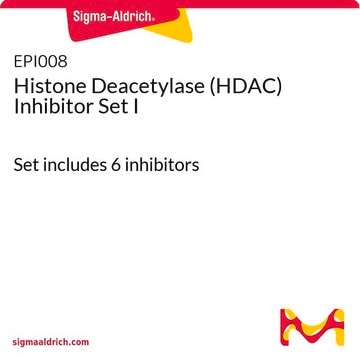C0621
CI−994
≥98% (HPLC), powder
Sinónimos:
4-Acetylamino-N-(2′-aminophenyl)benzamide, Acetyldinaline, Tacedinaline
About This Item
Productos recomendados
Quality Level
assay
≥98% (HPLC)
form
powder
color
off-white
solubility
DMSO: >10 mg/mL
storage temp.
room temp
SMILES string
CC(=O)Nc1ccc(cc1)C(=O)Nc2ccccc2N
InChI
1S/C15H15N3O2/c1-10(19)17-12-8-6-11(7-9-12)15(20)18-14-5-3-2-4-13(14)16/h2-9H,16H2,1H3,(H,17,19)(H,18,20)
InChI key
VAZAPHZUAVEOMC-UHFFFAOYSA-N
Gene Information
human ... HDAC1(3065) , HDAC10(83933) , HDAC11(79885) , HDAC2(3066) , HDAC3(8841) , HDAC4(9759) , HDAC5(10014) , HDAC6(10013) , HDAC7(51564) , HDAC8(55869) , HDAC9(9734)
Application
- as an histone deacetylase (HDAC) inhibitor to treat SUM229 and DT22 cells to study its effects
- as an HDAC inhibitor for screening in SPEL cells
- to study its effects on human myeloid and erythroid progenitors
Biochem/physiol Actions
Features and Benefits
related product
signalword
Warning
hcodes
Hazard Classifications
Eye Irrit. 2
Storage Class
11 - Combustible Solids
wgk_germany
WGK 3
flash_point_f
Not applicable
flash_point_c
Not applicable
ppe
dust mask type N95 (US), Eyeshields, Gloves
Certificados de análisis (COA)
Busque Certificados de análisis (COA) introduciendo el número de lote del producto. Los números de lote se encuentran en la etiqueta del producto después de las palabras «Lot» o «Batch»
¿Ya tiene este producto?
Encuentre la documentación para los productos que ha comprado recientemente en la Biblioteca de documentos.
Los clientes también vieron
Artículos
We offer a variety of small molecule research tools, such as transcription factor modulators, inhibitors of chromatin modifying enzymes, and agonists/antagonists for target identification and validation in gene regulation research; a selection of these research tools is shown below.
We offer a variety of small molecule research tools, such as transcription factor modulators, inhibitors of chromatin modifying enzymes, and agonists/antagonists for target identification and validation in gene regulation research; a selection of these research tools is shown below.
We offer a variety of small molecule research tools, such as transcription factor modulators, inhibitors of chromatin modifying enzymes, and agonists/antagonists for target identification and validation in gene regulation research; a selection of these research tools is shown below.
We offer a variety of small molecule research tools, such as transcription factor modulators, inhibitors of chromatin modifying enzymes, and agonists/antagonists for target identification and validation in gene regulation research; a selection of these research tools is shown below.
Nuestro equipo de científicos tiene experiencia en todas las áreas de investigación: Ciencias de la vida, Ciencia de los materiales, Síntesis química, Cromatografía, Analítica y muchas otras.
Póngase en contacto con el Servicio técnico









